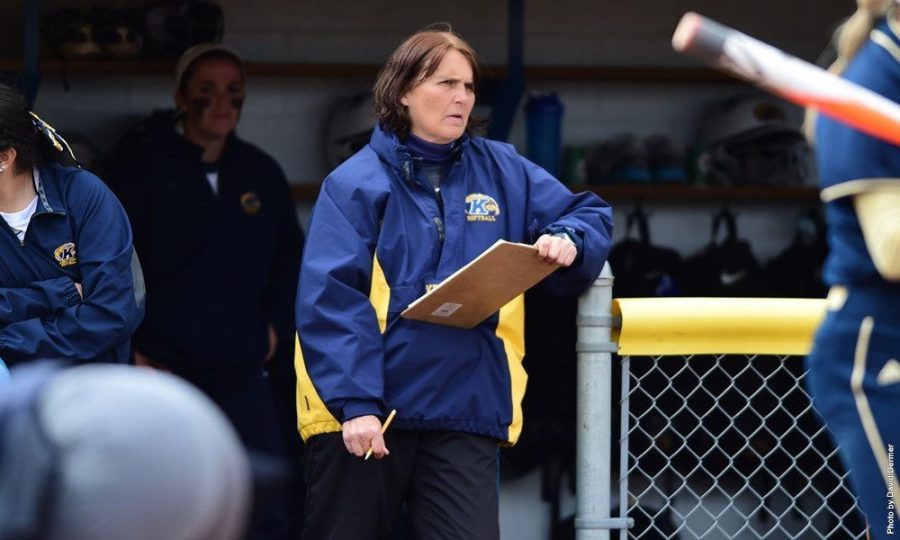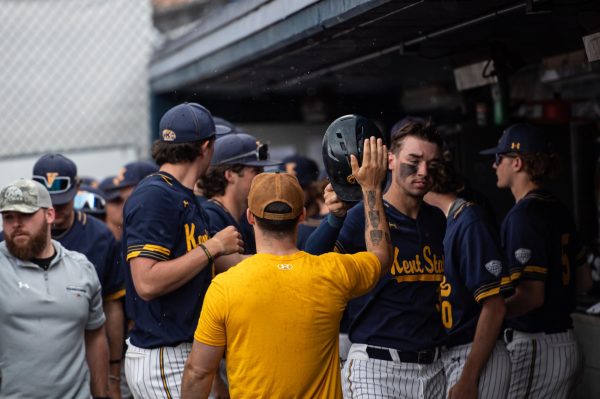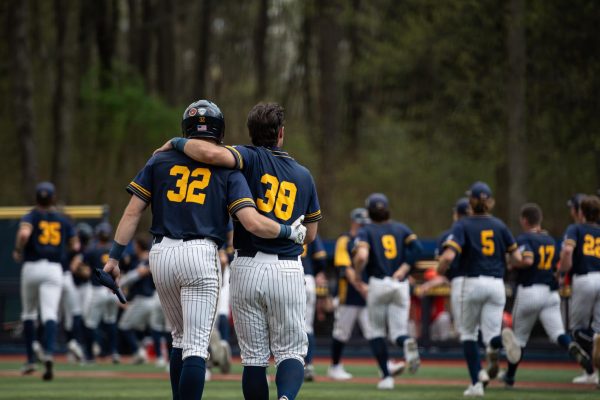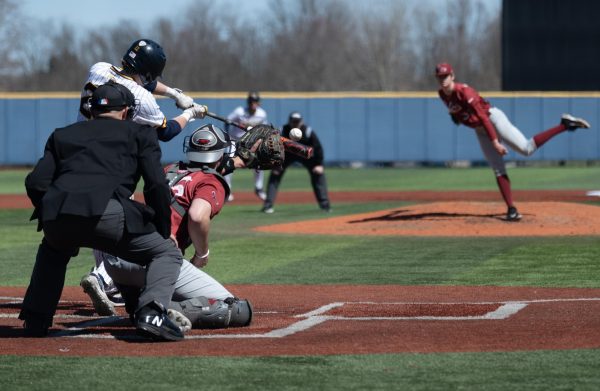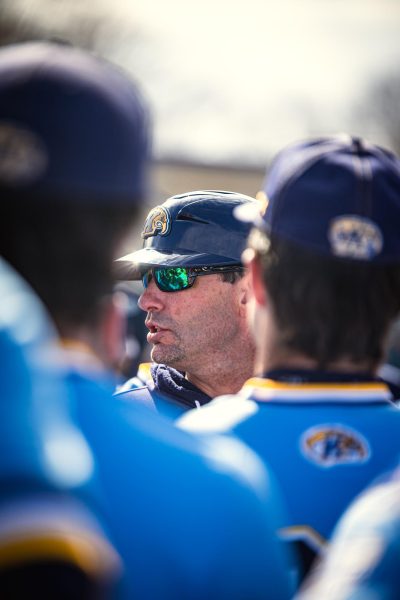Dispute over public records is latest court action in softball player’s Title IX lawsuit
July 14, 2017
Two complaints related to an earlier lawsuit by former softball player Lauren Kesterson were filed against Kent State and the Ohio Department of Higher Education (ODHE) in the Ohio Court of Claims in late June. The court actions say the university and the ODHE failed to completely respond to requests for public records.
Kesterson sued Kent State in federal court in February 2016 over its alleged violation of her rights under Title IX of the Education Amendments Act of 1972, which prohibits discrimination on the basis of sex in any federally funded education program or activity.
The suit said Tucker Linder, a then-varsity baseball player and the softball coach’s son, raped Kesterson in December 2012 and athletic department officials covered up the alleged incident.
University staff members, including Athletic Director Joel Nielsen, knew of the rape, the suit also states, and failed to follow university policy in investigating the allegation.
KentWired normally does not name victims of sexual assault, but Kesterson agreed to be identified.
The most recent actions involve two public records access violation complaints filed with the Ohio Court of Claims related to:
-
Records requested on May 16, 2017, about the university’s handling of Tucker Linder’s status as a student. The complaint was filed June 22, 2017.
-
Records were also requested on May 11, 2017, from the Ohio Department of Higher Education. The complaint was filed on June 29, 2017, requesting records submitted by Kent State as part of the Ohio Department of Education’s Changing Campus Culture Initiative.
The complaints state some of the requested records were never provided.
In addition to the actions taken in the Court of Claims, here are other developments in the case:
-
KentWired reported the university paid Karen Linder $25,000 despite her resignation as coach. Linder’s contract said if she resigned before the end of her contract period, she owed the university money, not the other way around. Linder resigned as head coach on August 28, 2015.
-
KentWired reported that if Karen Linder hadn’t resigned in August, the Office of Compliance, Equal Opportunity and Affirmative Action (EOAA) would have likely recommended sanctions against her for not reporting the alleged sexual assault. The EOAA investigation summary report from January 2016 found Linder failed to properly report Kesterson’s claims to the Title IX coordinator, which violated the university policies on sexual harassment and discrimination.
-
Assistant softball coach Eric Oakley, now the head coach, was added to the lawsuit on June 10, 2016. U.S. District Court Judge Sara Lioi partially granted Oakley’s request to be removed from the lawsuit on March 15, 2017, but he remains a defendant.
-
Kesterson filed two mandamus actions in the Ohio Supreme Court stating Kent State didn’t comply with public records requests outstanding since Feb. 2, 2016, and August 2, 2016. The two cases were sent to mediation.
-
Kent State asked to be removed from the lawsuit in April 2016, denying many of the claims made against it and saying it “is without knowledge on this topic.”
-
Linder asked the court in April 2016 to dismiss all claims against her in the lawsuit. Lioi ruled on March 15, 2017, the suit against Linder can continue and her request for qualified immunity is premature, since it’s only available in certain discretionary situations.
-
A tentative trial date is set for Dec. 3, 2018.
Kent State also asked to strike a portion of the lawsuit which detailed a 2015 incident where a female employee in the athletics department filed a sexual harassment complaint against Colin Miller, the senior fiscal manager for athletics.
Kesterson’s attorneys cited the investigation as evidence that Title IX violations occurred previously within the athletics department and stated the university took no action against Miller.
The EOAA office found Miller’s behavior over the course of a year-and-a-half was deemed “unacceptable and created a hostile and offensive work environment,” according to the investigation report obtained by KentWired.
Miller was suspended for 10 days without pay and required to attend mandatory workplace counseling, according to documents provided by the university. His office in the MAC Center was also moved to the Schwartz Center, and his master keycard, which granted him a higher level of access in the MAC Center and allowed him to enter the other employees’ offices, was revoked.
Kent State said in its motion that allegations from an unrelated internal investigation don’t have anything to do with Kesterson’s case. Lioi said it was too soon to determine if the handling of Miller’s case showed the university demonstrated “deliberate indifference” to sexual harassment claims.
In his appeal of the EOAA report’s findings, Miller called the allegations “a very one-sided investigation and nothing but a witch hunt,” according to documents obtained by KentWired.
Miller, who returned a phone call regarding this article, had no comment on the issue.
Ashlie Case Sletvold, an attorney for the Chandra Law Firm in Cleveland which is representing Kesterson, said the deadline for the attorneys to share information about the lawsuit is early next year.
“The rest of the year is (us) exchanging documents and what more we need and take depositions of people who were witnesses or around for some aspect of factual matter,” Sletvold said.
The parties in the lawsuit discussed a potential settlement in May and June of 2017, according to the federal court docket.
Eric Mansfield, executive director of media relations at Kent State, said the university has nothing new related to any of the Kesterson lawsuits to share publicly at this time.
Linder and Oakley’s attorneys could not be reached for comment.
Matt Poe is a reporter for KentWired. Contact him at [email protected].
// <![CDATA[ // <![CDATA[ // &lt;![CDATA[ // &amp;lt;![CDATA[ // &amp;amp;lt;![CDATA[ // &amp;amp;amp;lt;![CDATA[ // &amp;amp;amp;amp;lt;![CDATA[ // &amp;amp;amp;amp;amp;lt;![CDATA[ // &amp;amp;amp;amp;amp;amp;lt;![CDATA[ // &amp;amp;amp;amp;amp;amp;amp;lt;![CDATA[ // &amp;amp;amp;amp;amp;amp;amp;amp;lt;![CDATA[ // &amp;amp;amp;amp;amp;amp;amp;amp;amp;lt;![CDATA[ // &amp;amp;amp;amp;amp;amp;amp;amp;amp;amp;lt;![CDATA[ // &amp;amp;amp;amp;amp;amp;amp;amp;amp;amp;amp;lt;![CDATA[ // &amp;amp;amp;amp;amp;amp;amp;amp;amp;amp;amp;amp;lt;![CDATA[ // &amp;amp;amp;amp;amp;amp;amp;amp;amp;amp;amp;amp;amp;lt;![CDATA[ // &amp;amp;amp;amp;amp;amp;amp;amp;amp;amp;amp;amp;amp;amp;lt;![CDATA[ // &amp;amp;amp;amp;amp;amp;amp;amp;amp;amp;amp;amp;amp;amp;amp;lt;![CDATA[ dc.embed.load(‘https://www.documentcloud.org/search/embed/’, { q: “projectid: 34429-kesterson-lawsuit “, container: “#DC-search-projectid-34429-kesterson-lawsuit”, title: “Kesterson Lawsuit Documents”, order: “created_at”, per_page: 12, search_bar: true, organization: 546 }); // ]]&amp;amp;amp;amp;amp;amp;amp;amp;amp;amp;amp;amp;amp;amp;amp;gt; // ]]&amp;amp;amp;amp;amp;amp;amp;amp;amp;amp;amp;amp;amp;amp;gt; // ]]&amp;amp;amp;amp;amp;amp;amp;amp;amp;amp;amp;amp;amp;gt; // ]]&amp;amp;amp;amp;amp;amp;amp;amp;amp;amp;amp;amp;gt; // ]]&amp;amp;amp;amp;amp;amp;amp;amp;amp;amp;amp;gt; // ]]&amp;amp;amp;amp;amp;amp;amp;amp;amp;amp;gt; // ]]&amp;amp;amp;amp;amp;amp;amp;amp;amp;gt; // ]]&amp;amp;amp;amp;amp;amp;amp;amp;gt; // ]]&amp;amp;amp;amp;amp;amp;amp;gt; // ]]&amp;amp;amp;amp;amp;amp;gt; // ]]&amp;amp;amp;amp;amp;gt; // ]]&amp;amp;amp;amp;gt; // ]]&amp;amp;amp;gt; // ]]&amp;amp;gt; // ]]&amp;gt; // ]]&gt; // ]]> // ]]> View/search document collection


